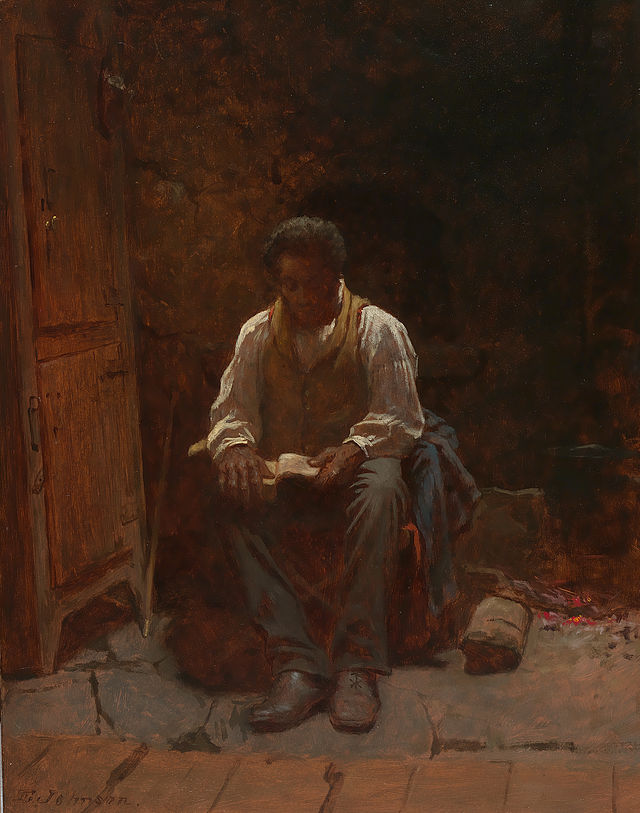Loading AI tools
Biblical psalm From Wikipedia, the free encyclopedia
Psalm 23 is the 23rd psalm of the Book of Psalms, beginning in English in the King James Version: "The Lord is my shepherd". In Latin, it is known by the incipit, "Dominus regit me".[1][2][3][4] The Book of Psalms is part of the third section of the Hebrew Bible,[5] and a book of the Christian Old Testament. In the slightly different numbering system used in the Greek Septuagint and Latin Vulgate translations of the Bible, this psalm is Psalm 22.
| Psalm 23 | |
|---|---|
| "The Lord is my shepherd" | |
 Illustration from The Sunday at Home, 1880 | |
| Other name | "Dominus reget me" |
| Written | around 1000 BC |
| Text | attributed to King David |
| Language | Hebrew (original) |
Like many psalms, Psalm 23 is used in both Jewish and Christian liturgies. It has often been set to music. Haredi educator Tziporah Heller referred to it as perhaps the best-known of the psalms due to "its universal message of trust in God, and its simplicity".[6]
The following table shows the Hebrew text of the Psalm with vowels,[7] alongside an English translation based upon the JPS 1917 translation (now in the public domain).[8]
| Verse | Hebrew | English translation (JPS 1917) |
|---|---|---|
| 1 | מִזְמ֥וֹר לְדָוִ֑ד יְהֹוָ֥ה רֹ֝עִ֗י לֹ֣א אֶחְסָֽר׃ | A Psalm of David. The LORD is my shepherd; I shall not want. |
| 2 | בִּנְא֣וֹת דֶּ֭שֶׁא יַרְבִּיצֵ֑נִי עַל־מֵ֖י מְנֻח֣וֹת יְנַהֲלֵֽנִי׃ | He maketh me to lie down in green pastures; He leadeth me beside the still waters. |
| 3 | נַפְשִׁ֥י יְשׁוֹבֵ֑ב יַֽנְחֵ֥נִי בְמַעְגְּלֵי־צֶ֝֗דֶק לְמַ֣עַן שְׁמֽוֹ׃ | He restoreth my soul; He guideth me on righteous paths for His name's sake. |
| 4 | גַּ֤ם כִּֽי־אֵלֵ֨ךְ בְּגֵ֪יא צַלְמָ֡וֶת לֹא־אִ֘ירָ֤א רָ֗ע כִּי־אַתָּ֥ה עִמָּדִ֑י שִׁבְטְךָ֥ וּ֝מִשְׁעַנְתֶּ֗ךָ הֵ֣מָּה יְנַֽחֲמֻֽנִי׃ | Yea, though I walk through the valley of the shadow of death, I will fear no evil, For Thou art with me; Thy rod and Thy staff, they comfort me. |
| 5 | תַּעֲרֹ֬ךְ לְפָנַ֨י ׀ שֻׁלְחָ֗ן נֶ֥גֶד צֹרְרָ֑י דִּשַּׁ֥נְתָּ בַשֶּׁ֥מֶן רֹ֝אשִׁ֗י כּוֹסִ֥י רְוָיָֽה׃ | Thou preparest a table before me in the presence of mine enemies; Thou hast anointed my head with oil; my cup runneth over. |
| 6 | אַ֤ךְ ׀ ט֤וֹב וָחֶ֣סֶד יִ֭רְדְּפוּנִי כׇּל־יְמֵ֣י חַיָּ֑י וְשַׁבְתִּ֥י בְּבֵית־יְ֝הֹוָ֗ה לְאֹ֣רֶךְ יָמִֽים׃ | Surely goodness and mercy shall follow me all the days of my life; And I shall dwell in the house of the LORD for ever. |

The theme of God as a shepherd was common in ancient Israel and Mesopotamia. For example, King Hammurabi, in the conclusion to his famous legal code, wrote: "I am the shepherd who brings well-being and abundant prosperity; my rule is just.... so that the strong might not oppress the weak, and that even the orphan and the widow might be treated with justice."[10] This imagery and language were well known to the community that created the Psalm,[clarification needed] and it was easily imported into its worship.[citation needed]
Psalm 23 portrays God as a good shepherd, feeding (verse 1) and leading (verse 3) his herd. The "rod and staff" (verse 4) are also the implements of a shepherd. Some commentators see the shepherd imagery pervading the entire psalm. It is known that the shepherd is to know each sheep by name,[citation needed] thus when God is given the analogy of a shepherd, he is not only a protector but also the caretaker. God, as the caretaker, leads the sheep to green pastures (verse 2) and still waters (verse 2) because he knows that each of his sheep must be personally led to be fed. Thus, without its shepherd, the sheep would die either by a predator (like the wolf) or of starvation, since sheep are known for their helplessness without their shepherd.
J. Douglas MacMillan argues that verse 5 ("Thou preparest a table before me") refers to the "old oriental shepherding practice" of using little raised tables to feed sheep.[11]: 78 Similarly, "Thou anointest my head with oil" may refer to an ancient form of backliner – the oil is poured on wounds, and repels flies. MacMillan also notes that verse 6 ("Goodness and mercy shall follow me") reminds him of two loyal sheepdogs coming behind the flock.[11]: 82
The header or first verse of the Psalm ascribes authorship to King David, said in the Hebrew Scriptures to have been a field shepherd himself as a youth. However, some scholars do not agree with this attributed authorship and hypothesize various other possibilities, commonly dating it to the post-exilic period.[12]
Taken together, Psalms 22, 23, and 24 are seen by some as shepherd psalms, where the good shepherd lays down his life for the sheep as a suffering servant and king.[13]
Psalm 23 is traditionally sung during the third Shabbat meal[14][15] as well as before the first and second, and in some of Jewish communities during the Kiddush. It is also commonly recited in the presence of a deceased person, such as by those keeping watch over the body before burial, and at the funeral service itself.[16][17]
This section needs additional citations for verification. (October 2021) |

For Christians, the image of God as a shepherd evokes connections not only with David but with Jesus, described as the "Good Shepherd" in the Gospel of John. The phrase "the valley of the shadow of death" is often taken as an allusion to the eternal life given by Jesus.
Orthodox Christians typically include this Psalm in the prayers of preparation for receiving the Eucharist.
The Reformation inspired widespread efforts in western Europe to make biblical texts available in vernacular languages. One of the most popular early English versions was the Geneva Bible (1557). The most widely recognized version of the psalm in English today is undoubtedly the one drawn from the King James Bible (1611).
In the Catholic Church, this psalm is assigned to the Daytime hours of Sunday Week 2 in the Liturgy of the Hours and is sung as a responsorial in Masses for the dead. In the Church of England's Book of Common Prayer, it is appointed to be read on the evening of the fourth day of the month.[18]
The psalm is a popular passage for memorization and is often used in sermons. Many phrases in the English translation of the psalm have become individually popular in their own right, in particular, “the Lord is my shepherd, I shall not want”, much of verse 4, and “my cup runneth over”.
In the 20th century, Psalm 23 became particularly associated with funeral liturgies in the English-speaking world, and films with funeral scenes often depict a graveside recitation of the psalm.[19] Official liturgies of English-speaking churches were slow to adopt this practice. The Book of Common Prayer has only Psalms 39 and 90 in its Order for the Burial of the Dead, and in the Episcopal Church in the United States, Psalm 23 was not used for funerals until the 1928 revision of the prayer book.
In Christianity, a number of paraphrased versions of Psalm 23 emerged after the Protestant Reformation in the form of Metrical psalms — poetic versions that could be set to hymn tunes. An early metrical version of the psalm in English was made in 1565 by Thomas Sternhold. Other notable metrical versions to emerge from this period include those from The Bay Psalm Book (1640),[20] the Sidney Psalms by Philip Sidney, and settings by George Herbert and Isaac Watts.[20]
One of the best known metrical versions of Psalm 23 is the Christian hymn, "The Lord's My Shepherd", a translation first published in the 1650 Scottish Psalter.[21] Although widely attributed to the English Parliamentarian Francis Rous, the text was the result of significant editing by a translating committee in the 1640s before publication.[22] The hymn is one of the most popular hymns amongst English-speaking congregations today, and it is traditionally sung to the hymn tune Crimond, generally attributed to Jessie Seymour Irvine.[23][24] Other melodies, such as Brother James' Air or Amazing Grace, Belmont, Evan, Martyrdom, Orlington, and Wiltshire may also be used.[25]
Another popular Christian hymn to be based on Psalm 23 is "The King of Love My Shepherd Is" by Henry Baker (1868).[26]
| Sternhold and Hopkins (1628)[27] | Bay Psalm Book (1640)[28] | Rous Psalter (1643)[29] | The Scottish Psalter (1650)[30] |
|---|---|---|---|
The Lord is only my support, |
The Lord to me a shepherd is, |
My Shepherd is the Living Lord |
The Lord's my Shepherd, I'll not want; |
Seamless Wikipedia browsing. On steroids.
Every time you click a link to Wikipedia, Wiktionary or Wikiquote in your browser's search results, it will show the modern Wikiwand interface.
Wikiwand extension is a five stars, simple, with minimum permission required to keep your browsing private, safe and transparent.